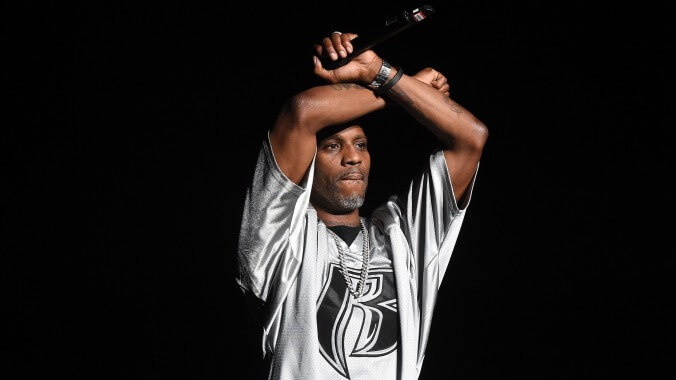R.I.P. DMX

A week after reportedly overdosing and suffering a heart attack, DMX has died, multiple outlets report. Born Earl Simmons, the rapper and actor was a foundational member of the Ruff Ryders hip hop collective, celebrated for breakout albums like 1998's It’s Dark And Hell Is Hot and its quickly arriving follow-up, Flesh Of My Flesh, Blood Of My Blood. As comfortable ripping through confessional tracks like 1998's “Slippin’” as he was on propulsive party jams like “X Gon’ Give It To Ya,” DMX helped shape the sound of rap at the turn of the century, favoring a verbally aggressive style that rarely relented and frequently stunned. He still holds the distinction of being the only musician to have albums chart at No. 1 on the Billboard 200 five consecutive times, and remains one of the most celebrated artists in all of hip hop. DMX died Friday at White Plains Hospital in New York on Friday, his family confirmed to People. He was 50.
Born in New York, DMX had a difficult childhood, often walking city streets to escape the reach of his physically abusive mother. It was during a stint in a boys home that he first began creating music, a process that soon saw him distributing demos on street corners. (It’s also this early period that saw him first develop the substance abuse issues that would color much of the rest of his life.) Quickly building a name for himself, with his own stage name pulled from one of the first instruments he ever made music with, DMX was signed by Columbia Records at the age of 22. But while little came of that first brush with success, his integration into New York’s underground hip-hop scene in the early ‘90s eventually bore fruit. Signed to Def Jam in 1998, his single “Get At Me Dog” primed the masses for the arrival of a new voice, and It’s Dark And Hell Is Hot paid off on the promise, eventually going quadruple platinum. The swift arrival of Flesh Of My Flesh just 7 months later cemented DMX’s new place at the center of New York—and, frankly, global—rap.
That increased profile and superstardom were also matched, though, with increased scrutiny from authorities, and DMX would spend the next several years balancing charges of drug possession, animal cruelty, criminal mischief, and more against his continued success in the musical world. (Certainly, early charges didn’t dissuade audiences from purchasing 1999's Grammy-nominated…And Then There Was X, which eventually went Platinum six times over.) It also didn’t get in the way of a budding acting career, which saw him debut in 1998's Belly before lending his talents to films like Romeo Must Die and Cradle 2 The Grave, both with Jet Li, and 2001's Exit Wounds, which paired him up with Steven Seagal. (And while “acting circles around Steven Seagal” comes close to damning with faint praise, DMX was undeniably praised for the charisma he brought to these roles.)
Meanwhile, the music continued to flow: The Great Depression in 2001, Grand Champ in 2003. If sales numbers were slipping, they weren’t slipping much; singles like “Who We Be” and “Where Tha Hood At” continued to propel DMX’s albums to the top of the charts. And while he frequently toyed with the idea of walking away from music in favor of fully embracing his Christian beliefs, he always seemed to find his way back—just as trouble always seemed to find its way back to him.
In 2018—six years past the release of the album we now know was his final one, 2012's Undisputed—DMX made headlines during sentencing for a then-long-running trial for tax evasion. (He reportedly didn’t file a tax return from 2010 to 2015, a period that, even accounting for lowered record sales, saw him bring in at least $2.3 million in revenue.) In an effort to explain his life to the judge, DMX and his attorneys took the bold step of playing “Slippin’” in the courtroom. The song’s lyrics—touching as they do on ambition, addiction, privation, the terrors of fatherhood, and the ever-present fear of falling so far behind that you fail everybody you’ve ever loved, including yourself—reportedly resonated with the judge, much as they seem to have for DMX himself. (He still got a year in jail, but his release in 2019 saw him gearing up for a possible new album with Def Jam.)
But, just as tales of addiction, rehab, prison, release, and relapse were all intertwined with the life story of Earl Simmons, so, too, was his music intertwined with the sound of rap in the 21st century. Often quantified as “gruff,” DMX’s style never allowed itself to be seduced by R&B, or even melody; his sharp delivery was often harsh, never slow, and wholly uncompromising. And people responded, in the millions, to the music and the man. In the span between his heart attack in early April 2021 and his death, the internet filled with tributes, highlighting not just the influence of DMX’s work, but stories of kindness and generosity to those around him.